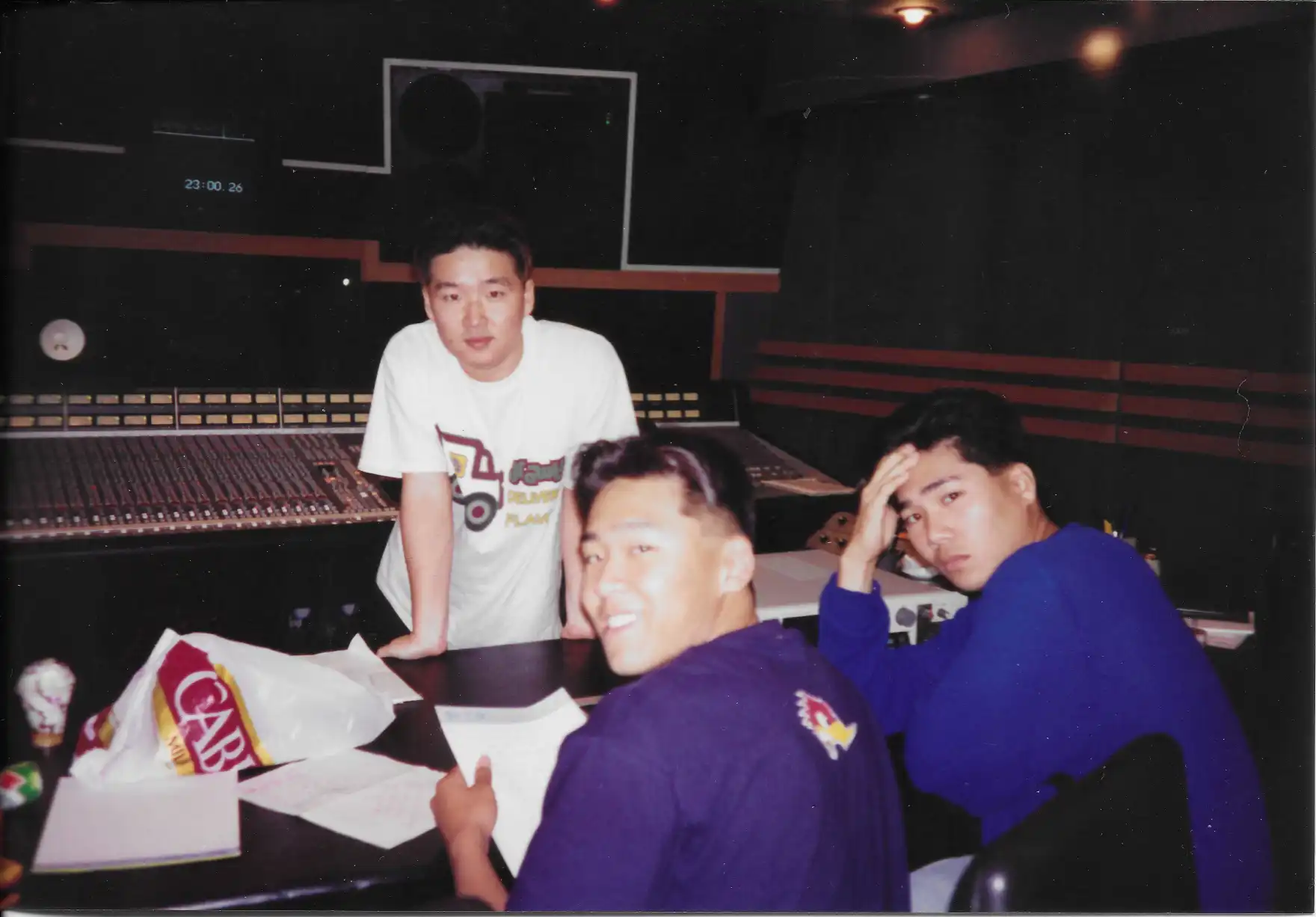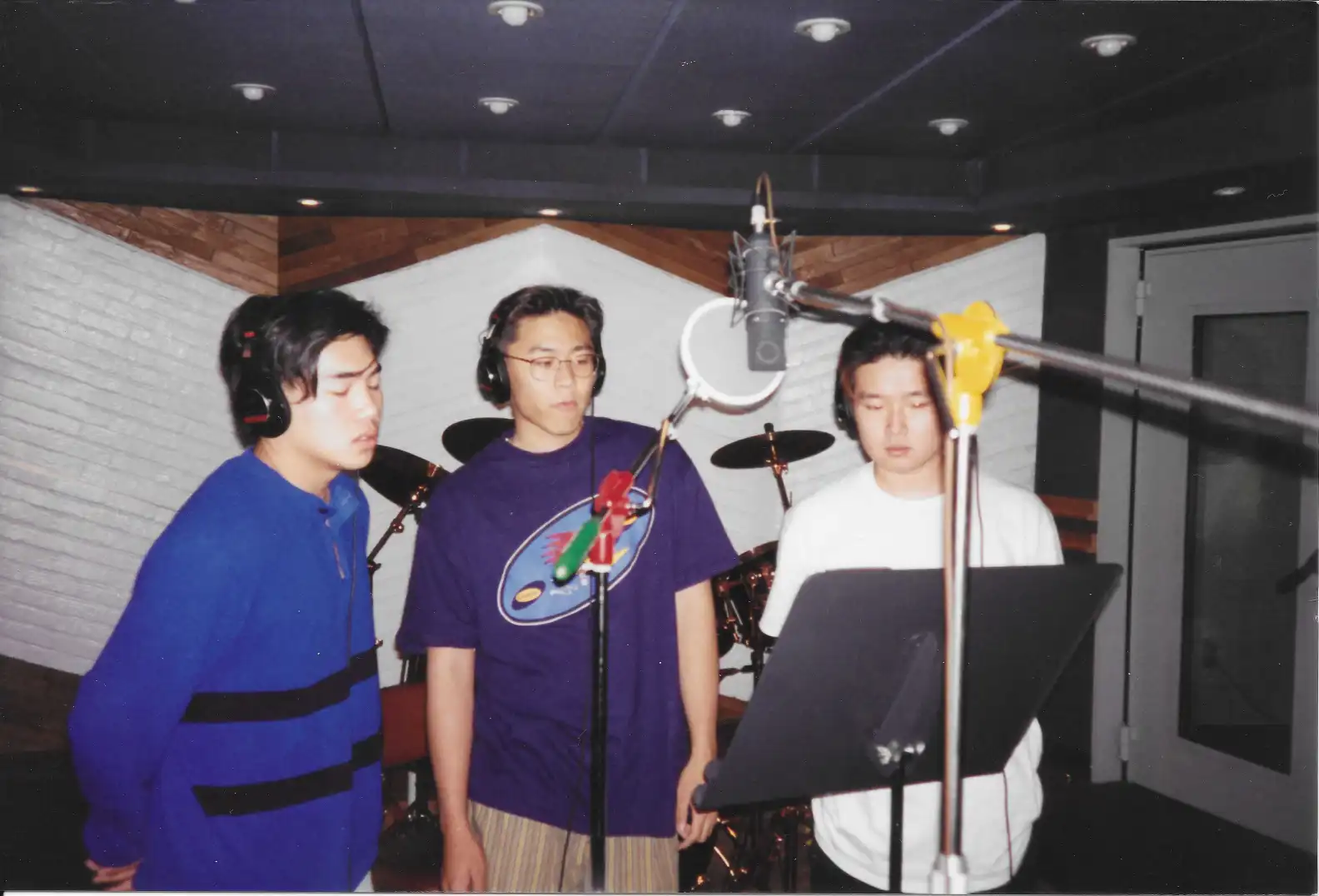NPR : California Love < K-Pop Dreaming [Ep5 Solid] >
 Thursday, March 16, 2023 at 11:19PM |
Thursday, March 16, 2023 at 11:19PM |  DFSB Kollective
DFSB Kollective 
CALIFORNIA LOVE : K-POP DREAMING
K-Pop Dreaming is about the rise and history of K-pop in the United States, as told from the point-of-view of the Korean diaspora in Los Angeles. Host Vivian Yoon takes listeners on a journey from K-pop's origins in Korean trot music and American presence in post-war South Korea to the 1992 LA Uprising and the booming global popularity of K-pop in the present day, all juxtaposed against Yoon's own coming-of-age as a second generation immigrant in Los Angeles, struggling to fit in and come to terms with her own identity. K-pop Dreaming is the second season of California Love, a podcast series from LAist Studios, which is a blend of memoir, pop culture analysis and oral history. In the first season Walter Thompson-Hernández was inspired by Tupac and Dr. Dre's "California Love"- a love letter and anthem for a generation. Walter invites listeners to join him in his family home, on horseback through the streets of Compton, and up into the sky to examine belonging.
K-Pop Dreaming : Ep5 Solid
The underground hip-hop scene in Los Angeles was thriving in the late 1980s. And there, soaking in the vibe, was a Korean American college student by the name of Jae Chong. He was also making music on the side, but didn't think much was going to come of it. That is, until an out-of-the-blue invitation brought him and his friends to Korea when K-pop was taking off. Their group, Solid, would become the Kings of R&B and the first Korean American act to make a splash in the Korean music industry. Vivian reflects on the importance of Solid and sees the group's Korean-Americanness as the cornerstone of their success. (Originally published March 16, 2023) Support K-pop Dreaming by donating now at LAist.com/join This episode is sponsored by BetterHelp. Save 10% off your first month at BetterHelp.com/Dreaming This episode is brought to you by your local Kia dealers. Visit kia.com to discover movement that inspires. This program is made possible in part by the Corporation for Public Broadcasting, a private corporation funded by the American people.
https://www.npr.org/podcasts
How 3 LA Kids Embraced R&B, Went To South Korea And Revolutionized K-Pop 1990s Korean R&B group Solid in South Korea making their breakthrough second album. From left to right: Producer Jae Chong (in the background), rapper John Lee, and singer George Kim. (Courtesy Jae Chong)A BRIEF HISTORY
1990s Korean R&B group Solid in South Korea making their breakthrough second album. From left to right: Producer Jae Chong (in the background), rapper John Lee, and singer George Kim. (Courtesy Jae Chong)A BRIEF HISTORY
Fun fact for the casual K-pop fans out there — scroll through the pantheon of the music’s hottest groups and you’ll find something in common: Many of them feature members who grew up outside of Korea.
From classic groups like 2PM and Girls’ Generation, to current chart-toppers like BLACKPINK and Stray Kids. Even H.O.T. — the OG boy band who was instrumental in shaping the early K-pop wave — had an overseas member.
But the group that arguably started the trend way back in the early 1990s? They’re called Solid, which was made up of three Korean Americans from Los Angeles County — childhood friends who first tinkered with music at home before getting an unexpected opportunity to go to South Korea to eventually become the “Kings of Korean R&B."
THE SOLID STORY
It starts with a kid named Jae Chong, who is the uber-producer and leader of Solid. His family immigrated to the suburbs of Cerritos in the ‘80s from South Korea. Like many immigrant families, his parents had to start from scratch in the U.S. But Chong found a cool new world in American music.
“Ozzy Osborne and Van Halen,” Chong says.
From there, he graduated to a different sound — one that was starting to dominate the U.S.
“In the late ‘80s, the glam rock and the whole rock thing sort of started dying down, and it started getting more into like R&B and hip-hop and rap,” says Chong.
And by then, Chong was also tinkering around and making music at home with his friends John Lee and George Kim, who would later become the rapper and singer of Solid, respectively.
The three friends met in church, but it was their love for music that bonded them together.
“Things that got my blood pumping was like break dancing and this new hip-hop thing that was happening,” remembers Kim. “We would have cardboard boxes hidden behind the trees at the bus stop, and then while waiting for the bus, we would all just break dance and, you know, pop and wave.”
Chong adds, “I was like that token Asian guy in every hip-hop club, like underground, and I sort of saw that whole kind of the renaissance of hip-hop in the early '90s in L.A..”
That “renaissance of hip-hop” he’s talking about happened in the late '80s and early '90s, when West Coast rappers like Ice-T, NWA, 2Pac, Cypress Hill and others were on the rise and dominating radio waves with their music.
“We all had low riders, so these cars that just slammed to the ground, that's how I rolled," says Chong.
"We just packed these cars with friends. We would just cruise up to L.A., and our friends would be performing at some of these very underground clubs,” says Chong. “Very grimy, very gritty, you know, and you just see smoke from the DJ booth just fill[ing] up the whole place.”
Through this hip-hop scene, Chong connected with a popular Taiwanese American boy group called LA Boyz, who asked the guys to collaborate.
One day, while the three were in the studio, the LA Boyz’s managers asked them to make their own demo. The manager was interested in signing them to a Taiwanese label.
“In the meantime, there was a production company in Korea, like they heard about us. And they’re like, ‘Yo, you guys are Korean, like, why are you going to Taiwan?’” says Chong.
The boys — then in their late teens and very early 20s — signed to the Korean label, and in the spring of 1993, they arrived in Seoul, South Korea to make their very first album.
CULTURE SHOCK
Right away, it was apparent that the Korean American boys looked different from other mainstream Korean artists at the time. They had their hair buzzed short and wore baggy clothes — repping the style that was popular in the L.A. hip-hop scene at the time.
“In Korea,” says Chong. “When we got there, we were heavily into hip-hop and the whole rap scene. We had the shaved heads with the long bangs, baggy clothes. Like, taxis wouldn’t pick us up.”
And that difference in sensibilities extended to their sound. They spent the next several months working on their first album. But Give Me A Chance had disappointing sales. Chong says it was partly because the music didn’t have enough Korean elements to make it popular with a Korean audience.
And there was one particular component Chong zeroed in on.
“If you look at every major hit song in Korea, it has that element,” says Chong.
It’s called ppongjak. Or “ppong,” for short.
“‘Ppong’ is essentially Korean blues, and it comes from decades of hardships and sufferings that Korean people went through throughout history,” says Chong. “That's one of the secret ingredients to K-pop really, that's what I started to kind of pick up on.”
Armed with this new insight, Chong went back in the studio to work on the group’s sophomore album. He enlisted the help of famous Korean ballad composer Kim Hyung-seok to learn about ppong and change up the group’s sound.
“The whole idea was to kind of fuse Asian sound with American sound, right?” says Chong. “In Korea, there's a lot of focus on the melody, whereas the U.S. is more about the beat, so we needed to have the beat going on with this melancholy melody, that’s what Korean music is all about.”
With this new concept, Solid dropped their second full-length album, The Magic of 8 Ball. The album’s biggest hit, Holding Onto the End of the Night, blends American R&B stylings with a contemporary Korean sound. The ballad quickly became one of Solid’s career-defining hits, eventually earning Solid the title the “Korean Kings of R&B.” These songs were popular and received a lot of play on the radio.
John Lee remembers the group performing the hit for the first time in front of a TV audience.
“When the lights came on, we went on and the screams were so loud, it was like absolute pandemonium,” says Lee. “I just remember our faces, we knew right then like, ‘Oh my God, we made it, we're famous.’”
After their first album, Solid continued to make hit after hit.
In 1997, the group decided to part ways, partly because Lee was overwhelmed by fame and wanted to finish his undergrad degree. He later went on to pursue a successful real estate career in Southern California. Chong returned to California and continued working as a music producer, working with artists worldwide. Kim stayed in South Korea and found success in a solo singing career. He’s known there today as Kim Johan.
SOLID'S LEGACY
By infusing R&B into Korean pop music, Solid was influential in shaping the sound of K-pop in its infancy.
“They were able to work within the R&B genre and kind of find a Korean flavor to it so that it felt distinctive rather than derivative,” says Bernie Cho, a music executive working in South Korea. From left to right: Singer George Kim, rapper John Lee, and producer Jae Chong of Korean R&B group Solid.“I think Solid’s success really was pioneering in the sense that they introduced a new music genre to Korea, R&B, which in many ways still influences Korean ballad songs,” continues Cho. “A lot of the soul that they brought with R&B resonates with a lot of the top Korean songs to this day.”
From left to right: Singer George Kim, rapper John Lee, and producer Jae Chong of Korean R&B group Solid.“I think Solid’s success really was pioneering in the sense that they introduced a new music genre to Korea, R&B, which in many ways still influences Korean ballad songs,” continues Cho. “A lot of the soul that they brought with R&B resonates with a lot of the top Korean songs to this day.”
Just as importantly, Solid’s success opened up the door for other Korean-Americans to headline K-pop groups.
Following Solid’s success, many K-pop music labels started recruiting Korean American members for their own groups. 1TYM. g.o.d. Shinhwa. All of whom still remain legendary household names in South Korea to this day. And it opened the door for non-Koreans to enter the K-pop scene — like Amber Liu of the girl group f(x), or Lisa from BLACKPINK.
“Jae Chong and the members of Solid, they were definitely part of that first wave and first-generation of Korean Americans who made an impact and had influence on not just Korean music industry, but just K-pop as a whole,” says Cho.
https://laist.com/news/arts-and-entertainment
By Minju Park
Podcast Featured Artist : Solid
Podcast Featured Commentator : Bernie Cho [DFSB Kollective]
 Agent,
Agent,  Band Marketing,
Band Marketing,  Content
Content 